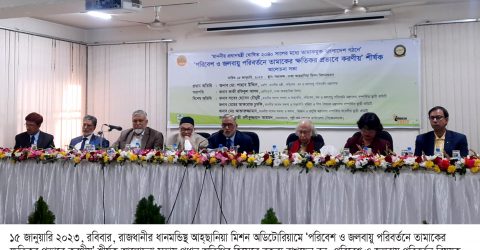Bangladeshi industries are exploring renewables due to power shortages.
The Bangladesh The Bangladesh
Today

Pinky Akter: Bangladesh’s power crisis – caused by gas shortages – is encouraging Bangladeshi industries to gradually convert to renewable energy sources such as solar power.
Although Bangladesh has targeted 100% electricity access for all people by March 2022, more than 50% of electricity is produced using natural gas.
Due to the tension in the supply of electricity due to the severe energy crisis and the fear of increasing the price of electricity in the future, as an alternative, many industrialists are walking the path of setting up solar power plants by producing a part of the electricity used in industrial factories on their own initiative.
Some entrepreneurs are also installing sophisticated appliances to reduce electricity consumption. They are trying to deal with the situation by installing boilers that work even at low gas pressure. Entrepreneurs said they do not see a sustainable solution to the gas and electricity crisis in the long term.
The crisis is intensifying day by day in thousands of small and big industries in the capital, Dhaka, Gazipur, and Narayanganj. Entrepreneurs are now desperately trying to keep the industry going despite spending extra on diesel. They have emphasized maintaining uninterrupted gas supply to the industrial areas around the capital by coordinating from less important sectors and places.
On the other hand, there is increased reliance on diesel to meet the current situation, which is driving up production costs.
Factories in some areas of the country, including Narayanganj, the center of knitwear production, are forced to run diesel generators dueshortagesre gas shortage. On one hand they have to pay the gas bill, on the other hand they have to spend crores of rupees every month as a result of using diesel.
In this situation, some industries are setting up solar power plants to meet part of their electricity needs on their own, entrepreneurs said.
Rising Group, the owner of one of the largest garment and textile factories in the country, has recently invested $2 million to install rooftop solar power plants in its two factories in Manikganj and Gazipur. The power plant of Manikganj has a daily power generation capacity of 12 MW. The Gazipur power plant has a daily production capacity of 3.5 megawatts.
Mahmud Hasan Khan Babu, Managing Director of Rising Group said, ‘We think that the gas-based electricity crisis will not end in the long term. Fuel prices are also uncertain. From the experience of the last few years, it seems that the price of electricity will continue to rise.
‘Therefore, as part of long-term preparations, we are trying to meet a part of the electricity consumption through solar panels. It is also a part of the Sustainable Green Energy Initiative.’
The group’s two solar power plants have a lifespan of 25 years. Mahmud said that the center will produce 5 thousand 282 megawatts of electricity in two years. It will reduce the emission of 63 thousand 751 tons of carbon dioxide (CO²) in 25 years and save about 4 lakh 71 thousand 759 barrels of crude oil.
Rising Group has taken a new initiative to increase the existing solar power production capacity by setting up a 3.6 MW power plant at the Manikganj factory. The new solar power plant will redcarbon dioxidexide (CO²) emissions by around 55,000 tonnes and save four million barrels of crude oil over its lifetime.
Many industrial owners have plans to install solar power plants as part of long-term preparations to deal with possible future energy crises.
Mostafiz Uddin, managing director of Denim Expert Limited, said, “We are planning to set up a solar plant with a capacity of 650 KW against the recent demand of 1.5 MW per day.”
“We have no option but to rely on the government’s actions. There are many uncertainties like international prices and availability of fuel and if there is,” he said, adding that the denim specialist plans to gradually become fully powered by renewable energy.
However, easier said than done. Solar installations require both heavy investment and space.
“It will be very difficult for small factories to meet the requirements of solar adoption, as many of them do not have the money to invest,” said Shahidullah, who is also the vice-president of the Bangladesh Garments Manufacturers and Exporters Association.
Less than 1 percent of the country’s electricity generation comes from renewable energy or solar power.
Alamgir Morshed, executive director and CEO of Infrastructure Development Company Limited (IDCOL) said in a discussion that the country has the potential to generate more than 4,000 megawatts of electricity through rooftop solar plants.
But industrialists say renewable energy may be of some benefit to factories that use relatively little gas or electricity. But it cannot be a substitute for gas.
Environmentalist and Bangladesh Supreme Court lawyer Syeda Rizwana Hasan said, “Where the developed world is under pressure to switch to renewable energy, we can make this demand more strongly in countries like Bangladesh.” By prioritizing solar power, we can overcome the energy crisis and open the door to a thriving economy. The best part is that it is completely eco-friendly.
In just three years between 2014 and 2017, 100,000 solar-powered water pumps were commissioned in India. In 2016, electricity generation from renewable energy as a single source was the highest in Germany. Germany became the top electricity exporter in Europe that year due to its reliance on solar and wind power. (WNISR 2017). On the other hand, India’s fourth busiest Cochin International Airport runs entirely on solar power.




